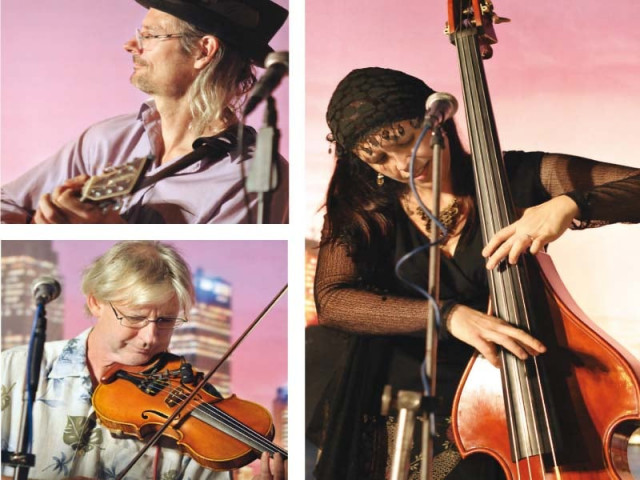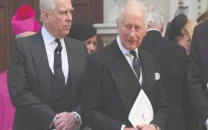Fiddler’s Feast: ‘Music is like a conversation’
The Australian trio, that promotes folk and jazz melodies, performs in Lahore.

Inspired by the unique concoction of jazz and folk notes, the band Fiddler’s Feast is anything but ordinary.
The band’s journey began when four disparate fiddlers posed for a photo shoot in the mid 1980s, but never got a chance to perform at the festival the picture was taken for. Ten years later, however, these musicians formed the band Fiddler’s Feast, which is now synonymous to the fiddling and folk scene in Australia.
Meet the band
Fiddler’s Feast’s recent line-up comprises of Andrew Clermont, Marcus Holden and Liz Frenchman. The band recently came to Pakistan to perform on Australia Day functions and sat down with The Express Tribune after their performance at the Avari Hotel on May 4.
The members say that fiddling does not require ‘rocket science’ and one just needs to have good aural skills to pick up the tunes they hear. “A lot of kids who take part in the choir already know fiddling but people still assume that one needs to be professionally trained in an orchestra to continue,” says Clermont, who was one of the founding members of the band. Holden and Clermont are also the directors of the Golden Fiddle Awards while Frenchmen, has her own cult following in the music scene in Australia.
Frenchman, who is playing with the band for the first time, played the double bass as well as contributed vocals to the band’s performances. When asked why she chose to come to Pakistan, Frenchman says that her main goal behind this tour was to find a way to connect with people. “It’s an incredible feeling when one gets to play with different people for different people,” says Frenchman. “I think that music is like a conversation, in which both the musician and listener speak, so the biggest thing for me is to reach that point of connection.”
Clermont says that musicians who love music often derail from the regimented mainstream pop culture, which sometimes sounds too cliched and imposed. He says that his band makes music that sounds good to them, which is why they don’t get labeled as mainstream musicians. “When you look at mainstream music you feel that it is being imposed on listeners, but for musician what matters more is to actually love the music they play,” says Clermont who is also known as the “master of all instruments”. The musician showed his skills by playing an old violin, which was made on the gold coast of Australia and a unique instrument which was created out of water pipes.
Violin playing versus fiddling
The word fiddle comes from English/Scandinavian language, while the word violin has French and Italian roots. When explaining the difference between playing the violin and fiddling, Holden states that a violinist reads compositions and then translates them into tunes. A fiddler, on the other hand, picks up on tunes that are passed on by one generation to another by word of mouth since there are no written composition.
A gift for Pakistan
During their trip to Pakistan, the band also managed to learn the tunes of Pakistani national anthem. The band’s frontman, Holden explains that western music is generally divided into two schools: Jazz and classical – therefore the musicians fused the anthem with jazz and classical melodies. “We go on the beauty, fun and resonance of a melody or tune because that’s what makes it alive,” says Holden, who is visiting Pakistan for the first time and hopes of picking up a sarangi. “Whatever we do is extremely special to me. Fiddlers like me, who grow up in a multicultural fiddle setting, try to look at the audience and see how it reacts to our music.”
Published in The Express Tribune, May 7th, 2012.



















COMMENTS
Comments are moderated and generally will be posted if they are on-topic and not abusive.
For more information, please see our Comments FAQ